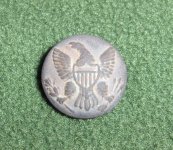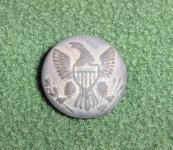ELVISFAN
Sr. Member
- Apr 26, 2007
- 343
- 2
- Detector(s) used
- WHITES DFX
- Primary Interest:
- All Treasure Hunting
ANY IDEAS ON THE BEST WAY TO CLEAN COPPER COINS THAT ARE DUG OR BOTTONS...DAVE


BuckleBoy said:Well...It depends on what type of button your talking about...
For old copper coins, I recommend the peroxide method. Here's the link, with examples:
http://forum.treasurenet.com/index.php/topic,117293.0.html
There is a link in that post to another topic on Tnet that tells you how to do it in detail.
Note: If you use olive oil first, then the peroxide won't work!
I do NOT recommend olive oil as a cleaning method. It seeps into the coin, then seeps out for years, creating a nasty, slick mess.
The result is even worse with buttons. Two piece dug buttons, such as Civil War buttons, can even fall apart due to being soaked in olive oil. I use a gentle toothpick cleaning with these to get them looking nice. I never put a button with any "plow damage" in water. It can literally fall apart. Here's an example or two of toothpicking:
A pre-Civil War Eagle Button that I toothpicked carefully:
And another (top left)
Any further questions, feel free to PM me.
Regards,
Buckleboy

Tin Nugget said:Now you tell me.
I have had a very cruddy 1865 two cent piece soaking in olive oil for 3 weeks now and while it is better it still needs help. If the peroxide method is no good after the olive oil, any other suggestions. Not to worried about value as it is pretty cruddy now.
 ) I'd certainly be standing back from the fumes on that one! LOL.
) I'd certainly be standing back from the fumes on that one! LOL.